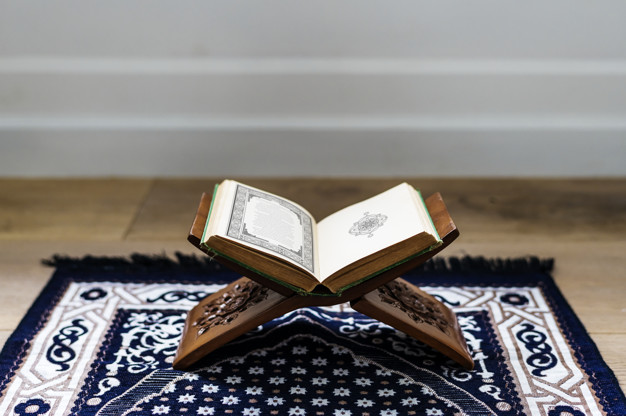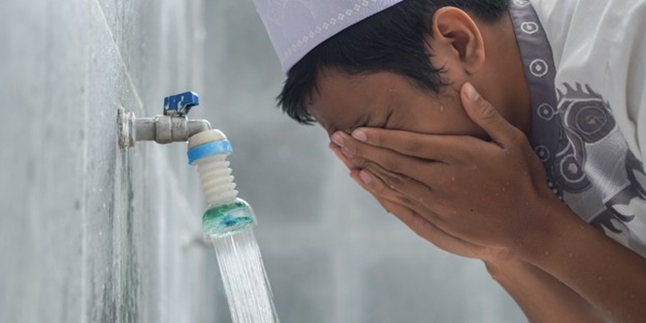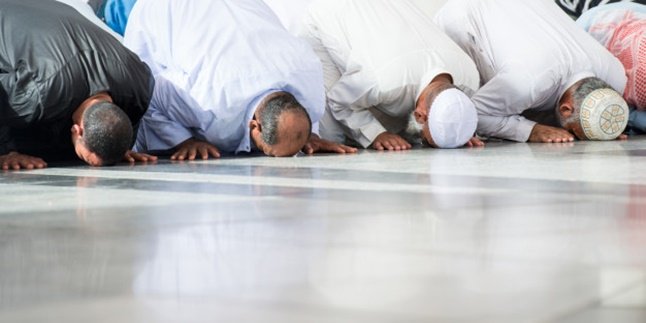Kapanlagi.com - Ramadan fasting becomes a mandatory worship for every Muslim. Observing Ramadan fasting is done in a state of purity and cleanliness. That is why women who are menstruating are not allowed to fast. Fasting is also not allowed for those who have not performed a full ablution after having sexual intercourse.
To cleanse the body and purify oneself from major impurities, a person must perform a full ablution. A full ablution is performed after a person has had sexual intercourse, after a man has ejaculated, and for women after menstruation and postpartum bleeding.
So, what if a full ablution is performed after dawn? Is it still allowed to fast? According to various sources, here is the ruling on performing a full ablution after dawn that you must know. Let's check it out, KLovers.
1. The Law of Husband and Wife Relationship in Ramadan

Illustration (credit: Freepik)
Before knowing the ruling on taking a bath after dawn, it is good for those of you who are married to know the ruling on having sexual intercourse during the month of Ramadan. There are many questions asked, is it permissible to have sexual intercourse during Ramadan? In the Quran, in Surah Al-Baqarah, verse 187, Allah says the following:
"It has been made lawful for you to approach your wives during the nights of the fast. They are a garment for you and you are a garment for them. Allah knew that you were betraying yourselves, so He turned to you in mercy and forgave you. So now, you may approach them and seek what Allah has ordained for you. Eat and drink until the white thread of dawn becomes distinct from the black thread. Then complete the fast until nightfall and do not approach them while you are in retreat in the mosques. These are the limits set by Allah, so do not approach them. Thus does Allah make clear His verses to the people that they may fear Him."
Meaning: It is permissible for you to approach your wives during the nights of fasting. They are a garment for you and you are a garment for them. Allah knew that you were betraying yourselves, so He turned to you in mercy and forgave you. So now, you may approach them and seek what Allah has ordained for you. Eat and drink until the white thread of dawn becomes distinct from the black thread. Then complete the fast until nightfall and do not approach them while you are in retreat in the mosques. These are the limits set by Allah, so do not approach them. Thus does Allah make clear His verses to the people that they may fear Him. Thus Allah explains His verses to mankind, so that they may be conscious of Him.
From the above verse, it can be explained that those who are married are allowed to engage in marital relations at night. However, it is preferable not to engage in sexual intercourse from dawn until sunset during the fasting month of Ramadan, as there is no obligation to do so.
2. The Law of Ghusl after Fajr

Illustration (credit: Freepik)
And here is the law regarding ghusl after Fajr, whether the fasting of that day is accepted by Allah SWT. In a hadith narrated by Aisha, may Allah be pleased with her, she said:
"The Messenger of Allah, may peace and blessings be upon him, once experienced the dawn of Ramadan in a state of janaba (major ritual impurity) not due to a wet dream. Then he performed ghusl and continued his fast." (Narrated by Bukhari and Muslim)
From this hadith, scholars concluded that the law of performing ghusl after Fajr is permissible or allowed. According to Sheikh Hasan Sulaiman An-Nuri and Sheikh Alawi Abbas Al-Maliki in the book Ibanatul Ahkam, it can be inferred from this hadith that a person in a state of janaba is allowed to delay performing ghusl until after the dawn has broken. However, it is preferable to hasten the ghusl before the time of dawn arrives.
3. Things that Must be Cleaned with Junub Bath

Illustration (credit: Freepik)
After knowing the ruling of junub bath after dawn, here are some things that must be known by a Muslim. What things should be noticed and cleaned with junub bath. Here are some things that must be cleaned with junub bath:
- Ejaculation, whether it is done through sexual intercourse between husband and wife, wet dream, or intentionally released through masturbation. Specifically for sexual intercourse, whether semen is released or not, husband and wife are required to perform junub bath after finishing it.
- Menstrual blood or postpartum bleeding. This specifically applies to Muslim women who experience menstruation or have just given birth. If the impure blood has stopped flowing from their genitals, they must perform junub bath.
- A convert, or someone who has recently embraced Islam. This is done to purify oneself.
4. General Intention for Performing Junub Bath

Illustration (credit: Freepik)
As previously explained, being in a state of junub can be caused by several factors. Therefore, the intention for performing junub bath may vary depending on the cause. First, the general intention for performing junub bath can be recited by adult males or females who want to remove major impurity after engaging in sexual intercourse. The following is the general intention for performing junub bath:
"Nawaitul ghusla lifrafil hadatsil akbari fardhan lillahi ta'aala."
Meaning: I intend to perform a major ablution to remove major impurity as an obligatory act for the sake of Allah Ta'ala.
5. Intention for Performing Junub Bath After Menstruation

Illustration (credit: Freepik)
Next is the intention for performing junub bath after menstruation. A woman who has completed her menstrual cycle is obligated to purify herself by performing junub bath. The following is the intention for performing junub bath for a woman after menstruation:
"Nawaitul ghusla lifraf il hadatsil haidil lillahi ta'ala."
Meaning: I intend to perform a compulsory bath to purify from major impurity due to menstruation for the sake of Allah Ta'ala.
6. Intention of Performing Ghusl after Postpartum Bleeding

Illustration (credit: Freepik)
And the last one is the intention of performing ghusl after postpartum bleeding. Similar to after menstruation, a woman who has completed her postpartum period is also obligated to purify herself by performing ghusl. Postpartum bleeding is the discharge of blood from a woman's uterus after giving birth. Usually, a woman will experience bleeding after giving birth for approximately 40 days. Here is the intention of performing ghusl for a woman after completing her postpartum period:
"Nawaitul ghusla liraf il hadatsil nifasi lillahi ta'ala."
Meaning: I intend to perform the obligatory ghusl to purify the major impurity of postpartum bleeding for the sake of Allah ta'ala.
Those are some intentions for performing ghusl, and also the ruling on performing ghusl after dawn. Hopefully, by knowing the ruling on performing ghusl after dawn, it can increase your knowledge.
(kpl/dhm)
Disclaimer: This translation from Bahasa Indonesia to English has been generated by Artificial Intelligence.


















